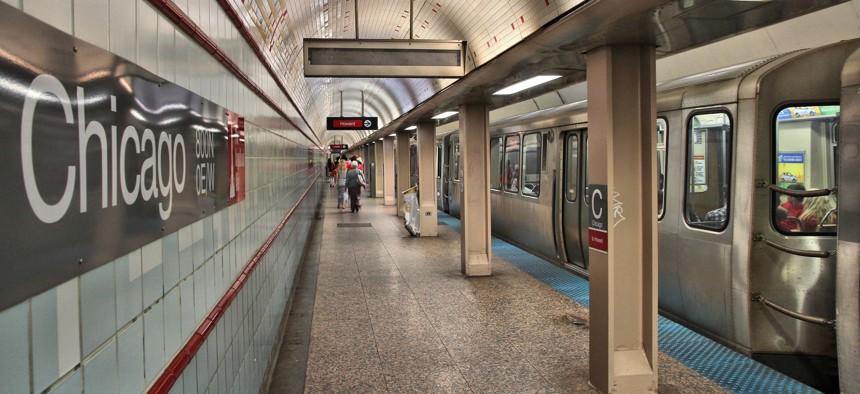Chicago’s Race Against Time; West Virginia Optimism vs. Realities of Market Forces

The Chicago Transit Authority is trying to secure federal funding to help rehabilitate stretches of the Red Line on Chicago's North Side. Shutterstock

Connecting state and local government leaders
Also in our State and Local Weekend Digest: Pa. municipalities want cut of Uber gross receipts; Flint water delivery order; and missing police firearms in Tucson.
Here are state and local government stories that caught our eye this weekend.
TRANSPORTATION FUNDING | The administration of Chicago Mayor Rahm Emanuel is in a race against time, trying to secure approval of $1.1 billion in federal grants to help rebuild the Chicago Transit Authority’s Red Line track infrastructure on the city’s North Side and improve signaling. What’s the hurry? Local officials want the money approved before President Obama leaves office. [Crain’s Chicago Business]
ECONOMIC DEVELOPMENT | Industry and energy experts express high doubt in claims from Bill Raney, the president of the West Virginia Coal Association, that the Mountain State could soon see annual coal production in the state rise above 120 million tons, a level not seen since 2012. While Raney says Donald Trump’s White House victory “gives us a little spark of hope,” the New York billionaire won’t easily be able to shift the reality of market forces. “Cheap and abundant natural gas and dramatically falling costs for renewables” puts coal at a disadvantage. [Charleston Gazette-Mail]
MUNICIPAL REVENUE | While transportation network company services like Uber and Lyft are now officially allowed to operate across Pennsylvania thanks to recently passed state legislation that was signed by Gov. Tom Wolf, but there’s a regulatory sticking point left unaddressed that some municipalities want to see resolved: Municipalities, like Pittsburgh, are not able to collect a percentage of gross receipts from the ridebooking services, revenue that could go toward priorities like education funding. (Philadelphia is an exception. The Philadelphia Parking Authority, which regulates taxis, is authorized to collect 1.4 percent of gross receipts from Uber.) [Keystone Crossroads]
FLINT WATER CRISIS | A federal judge ordered the home delivery of bottled water to Flint, Michigan residents by the state and local governments. "The fact that such items are available does not mean that they are reliably accessible or effective in furnishing safe drinking water to every household." wrote U.S. District Judge David Lawson. "Indeed, the endeavor of hunting for water has become a dominant activity in some Flint residents' daily lives." [WEMU]
LAW ENFORCEMENT | From January 2010 to June 2016, nearly 30 firearms were either stolen or went missing from the Tucson Police Department and Pima County Sheriff’s Department. Only 10 have been recovered. [Arizona Daily Star]
CYBERSECURITY | Idaho’s state government will purchase a $25 million cybersecurity insurance policy after the hack of Department of Fish and Game data held by a vendor. [The Spokesman-Review]
ANIMAL WELFARE | The New Jersey Supreme Court may settle a dispute between animal rights activists and state regulators in New Jersey over trapping raccoons using “enclosed foothold traps.” Steel-jaw traps were banned 32 years ago in the Garden State. [The Record]
LAND MANAGEMENT| Officials with the Shoshone National Forest are proposing to log around 2,000 acres of pines, spruces and aspens along the Chief Joseph Scenic Byway between Yellowstone National Park and Cody, Wyoming. The trees have been devastated by the western spruce budworm, which can raise the risk of wildfires. [Billings Gazette]

NEXT STORY: Massive Medicaid Fraud Busts Offer Blueprint for States




